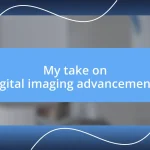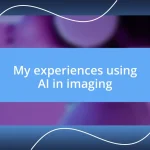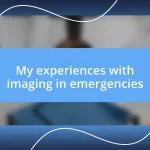Key takeaways:
- Imaging specialists are integral to patient care, blending technical expertise with emotional intelligence to provide comfort and accurate diagnoses.
- Technological advancements, including AI and 3D printing, are transforming imaging practices, enhancing diagnostic accuracy and patient outcomes.
- Ongoing education and certification are essential for imaging specialists to adapt to evolving technologies and improve their roles within healthcare teams.

Understanding Imaging Specialists Roles
Imaging specialists play a crucial role in the healthcare field by providing essential diagnostic support through various imaging technologies. I remember a time when a radiologic technologist patiently guided me through an MRI procedure. Their expertise not only eased my anxiety but also highlighted how crucial their role is; they aren’t just technicians but integral members of the medical team.
These specialists operate state-of-the-art equipment, producing detailed images that help physicians make informed decisions about patient care. Have you ever considered how much trust we place in these professionals? I think about it often, especially when I see images like CT scans that can reveal life-saving information in a split second. Their skill helps demystify complex medical conditions, enabling timely and accurate diagnoses.
In addition to technical skills, imaging specialists must be adept at patient interaction. One particular encounter that stands out to me was with an ultrasound technician who took the time to explain the process to a nervous patient. This emotional intelligence is vital; it fosters a calming environment and builds trust. It made me realize that their role extends far beyond the machines—they truly become a source of comfort in what can be a stressful experience for many patients.

Importance of Imaging Specialists
Imaging specialists are not just technicians; they are the backbone of diagnostic medicine. I recall a situation where a skilled technologist expertly navigated a challenging X-ray for a young child. The way they interacted gently, cracking a joke here and there, transformed a potentially scary experience into something much more manageable for the child and their parents. It’s the little things, like a comforting smile or clear instructions, that can make all the difference in patient care.
Moreover, their expertise can directly impact treatment outcomes. I’ve seen firsthand how an imaging specialist’s attention to detail can reveal even the smallest anomalies in scans. This kind of precision is essential; a missed detail could mean the difference between proactive treatment and delayed diagnosis. It’s fascinating how these professionals, armed with advanced imaging techniques, contribute significantly to a patient’s health journey.
The collaborative nature of their work further underscores their importance. During a case review meeting, I witnessed imaging specialists discuss findings with physicians, sharing their insights and perspectives. It was a powerful reminder that these discussions can truly shape patient management strategies. In those moments, their knowledge not only enhances the accuracy of diagnoses but also demonstrates the synergy required in modern healthcare.
| Skill Category | Importance of Imaging Specialists |
|---|---|
| Technical Expertise | Essential for accurate imaging and diagnosis |
| Patient Interaction | Provides comfort and builds trust with patients |
| Collaboration | Contributes to multidisciplinary healthcare teams |

Key Skills for Imaging Specialists
Key skills for imaging specialists are vital to not only their success but also to the overall patient experience. From my interactions, I’ve noticed that adaptability ranks high on the list. Once, I met a radiologic technologist who was faced with a last-minute change in the imaging protocol for a patient. Their ability to quickly adapt and communicate the new requirements not only ensured that the procedure went smoothly but also reassured the patient, who was understandably nervous about the unexpected change.
In addition, technical proficiency is non-negotiable. I remember participating in a training session where an imaging specialist demonstrated how to operate a new MRI machine. Their thorough knowledge and ability to troubleshoot on-the-spot instilled confidence in everyone present. It’s clear that ongoing education and training are crucial in this ever-evolving field, where new technologies emerge regularly. Here’s a breakdown of the key skills:
- Technical Expertise: Mastery of imaging equipment and procedures.
- Adaptability: Quick response to changes in protocols and patient needs.
- Emotional Intelligence: Building rapport and providing emotional support to patients.*
- Collaboration: Working effectively with healthcare teams to optimize patient care.
Another crucial skill is the capacity for critical thinking. I once observed an ultrasound technologist who, noticing something unusual during the procedure, flagged it for further review. That kind of attentiveness can make a significant difference in a patient’s health trajectory. It’s not just about obtaining images; it’s about understanding their implications and acting on them swiftly.
Moreover, communication skills cannot be overlooked. During a follow-up consultation, I appreciated how an imaging specialist succinctly explained complex scan results in layman’s terms. Their ability to break down jargon ensured the patient grasped the essentials, allowing for informed decision-making moving forward. It’s refreshing to see such clarity, as it fosters a partnership between the specialist and the patient. Here’s a quick list of additional essential skills:
- Critical Thinking: Ability to analyze and interpret imaging results effectively.
- Communication Skills: Translating complex information into understandable terms.
- Attention to Detail: Ensuring the highest quality images and accurate reporting.
- Problem-Solving: Quickly addressing challenges that arise during procedures.

Educational Pathways for Imaging Specialists
Educational pathways for imaging specialists are quite varied and can lead to rewarding careers in healthcare. Many start with a foundational degree, such as an associate’s degree in radiologic technology. I remember meeting a recent graduate who shared how her education not only taught her technical skills but also instilled a deep sense of empathy for patients. It made me reflect on how critical those early experiences are in shaping compassionate professionals.
As one progresses, pursuing certifications can significantly enhance career prospects. My friend, a seasoned MRI technologist, often emphasizes the impact of earning specialized credentials. She notes that these certifications not only validate their skills but also open doors to advanced positions in healthcare organizations. I find it fascinating that these experts are continually learning, adapting to new technologies, and embracing ongoing education to stay relevant in their field.
Additionally, some imaging specialists choose to further their education by pursuing bachelor’s or even master’s degrees. I once chatted with a radiology manager who explained how her advanced studies equipped her with valuable leadership skills. She mentioned that understanding the business side of healthcare is essential for those looking to move up the ladder. Isn’t it interesting how the right educational choices can not only shape one’s technical abilities but also empower them to lead and inspire others in the healthcare ecosystem?

Technological Advancements in Imaging
Technological advancements in imaging are truly reshaping the healthcare landscape. I recall being in a radiology department when the team introduced a cutting-edge CT scanner that significantly reduced radiation exposure while enhancing image clarity. This not only improved diagnostic accuracy but also underscored a commitment to patient safety, which is paramount in our field. Such innovations can sometimes feel like magic when you think about how far we’ve come from traditional methods.
Moreover, artificial intelligence (AI) is making waves within imaging specialties. During a recent seminar, I had the opportunity to hear about an AI-powered software that assists radiologists by highlighting potential areas of concern in scans. The presenter mentioned how it acts almost like a second set of eyes, increasing the speed and accuracy of diagnoses. It made me wonder: how would patients feel knowing that technology is not only streamlining processes but potentially elevating their care outcomes?
The advent of portable ultrasound machines also deserves a mention. I’ve seen firsthand how these devices have facilitated emergency care in remote locations, allowing practitioners to make critical decisions on the spot. I remember a scenario where a portable unit was used to assess a trauma patient in the field. The prompt imaging allowed for quicker treatment, which, in situations like this, can make all the difference. Isn’t it incredible how technology can bridge gaps in care and enhance patient outcomes?

Challenges Faced by Imaging Specialists
The challenges imaging specialists face are often multifaceted and can significantly impact their daily workflow. One pressing issue is the hefty workload that comes with precision and timeliness. I recall a particularly hectic day in the imaging department; I was struck by how my colleagues managed multiple patients while ensuring each scan was accurate. The pressure can be overwhelming, yet it showcases their dedication to patient care amidst chaos.
Another challenge is the emotional toll of delivering difficult news to patients. I once stood with a friend, an X-ray technician, as he explained the results of a scan to an anxious family. The air thick with tension, I felt the weight of the moment. It’s one thing to operate complex machinery; it’s another entirely to be the bearer of life-changing news. This emotional burden is something that, despite the technical skills involved, requires immense empathy and resilience.
Lastly, the rapid evolution of technology can be daunting. While it brings excitement, it also demands constant adaptation. I’ve seen fellow technologists struggle to keep pace with new equipment and software updates. One conversation with a colleague highlighted her frustration with mandatory training sessions that felt endless yet necessary. How can we expect to provide the best care if we’re constantly playing catch-up? Balancing continuous learning with patient demands truly tests the resolve of those in this field.

Future Trends in Imaging Specialties
As I look to the future of imaging specialties, I can’t help but feel excited about the integration of 3D printing technology. Just imagine being able to create a patient-specific model from their scans! I recently attended a workshop where a fascinating case was presented, where a 3D model of a patient’s heart was printed to facilitate a complex surgical procedure. It really hit home how this innovation could enhance surgical planning and ultimately improve patient outcomes. Have you ever considered how tangible models might make a difference in how we educate both patients and medical teams?
In addition to that, telemedicine is becoming increasingly influential in imaging. I remember a late-night shift when I assisted a radiologist who was working remotely, analyzing scans from a different city. The collaboration was seamless, and it dawned on me how this flexibility not only boosts efficiency but also expands access to expert opinions, especially in underserved areas. Isn’t it fascinating to think that we can now reach patients miles away with just a click?
Furthermore, the rise of personalized medicine is revolutionizing how we approach imaging. I witnessed this firsthand when my friend, a nuclear medicine technologist, described tailoring imaging protocols based on a patient’s genetic profile. It prompted me to wonder—could understanding an individual’s unique biology lead to more accurate diagnoses? The possibilities seem endless, and it leaves me eager to see how these advancements will redefine our roles in the imaging field.












